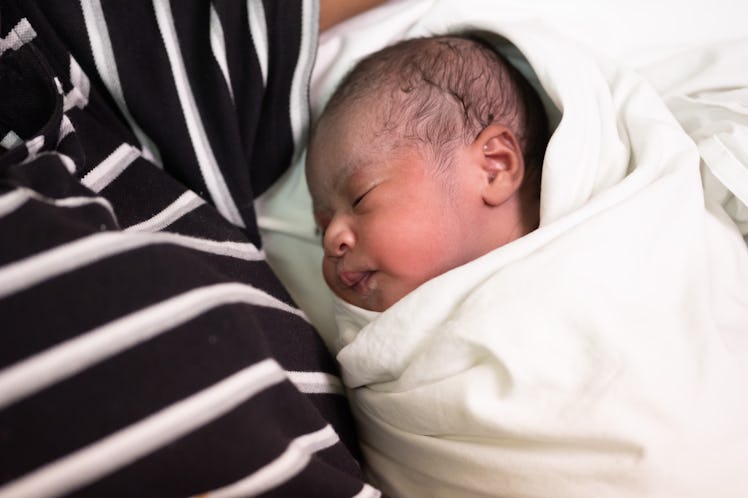
The First Baby Of 2019 Is Already Helping UNICEF Change The World
The new year is officially here, and with the new calendar comes thousands of new additions to families around the globe. On Tuesday, Jan. 1, children's advocacy organization UNICEF announced the first baby of 2019 — and it's as precious as you'd hope it would be. And it may just inspire you to get involved in a new cause this year.
Starting in 2019, the future is literally female. The first baby of the year, per the international child welfare organization UNICEF, was a as-yet-unnamed little girl who was born to mother Losena Adi Bale in Suva, Fiji at the stroke of midnight on Jan. 1, 2019. Bale, 42, was one of two mothers at the Colonial War Memorial Hospital there to give birth between 12:00 midnight and 12:01 a.m. Because of how the time zones are laid out, there was a "first baby" of the year in each time zone as the clock strikes midnight — but because Fiji belongs to one of the first time zones to ring in the New Year, babies there have the first shot at being first born. According to UNICEF, the last "first baby" of the year is likely in the United States, presumably in one of the Western-most regions in the latest time zones.
Welcome to all our tiny new humans!
However, little baby Bale can't lay the only claim to being a first baby. To celebrate the arrival of 2019, UNICEF gathered some adorable photos from New Year's babes from different time zones around the world. Of some of the key cities, UNICEF estimated that Sydney will receive about 168 new babies, Tokyo 310, Beijing 605, Madrid 166, and New York 317 on New Year's Day. In all, UNICEF projected almost 400,000 babies to be born on Jan. 1 alone.
A quarter of all new babies born are in Southern Asia, and per UNICEF, more than half of New Year's babies worldwide were born in one of the following eight countries: India, China, Nigeria, Pakistan, Indonesia, United States, Democratic Republic of Congo, and Bangladesh. (That's a lot of babies.)
Meet little Rayan Saleh, born at Malalai Maternity Hospital in Kabul, Afghanistan at 9:00 a.m. on Jan. 1.
Lincoln Allen McDougall, born in Canberra, Australia at 4:06 p.m., looks ready for a nap already.
Li Xin Yao, born at 10:19 a.m. at Beijing United Family Hospital in Beijing, China, is ready to meet the world.
And a still-unnamed baby boy, who was born at Lagos Island Maternity Hospital in Lagos, Nigeria at 12:00 a.m., is bringing all the adorable.
But it's not all cute baby photos. UNICEF highlights and tracks the first babies of the year to raise awareness about a key issue facing the world's newborns: infant mortality. While a lot of progress has been made towards reducing childhood mortality overall in recent years, the organization says, the numbers are still grim, particularly in regards to newborns.
In 2017 alone, more than a million infants died in their first day, with another 2.5 million not making it past their first month, accounting for 47 percent of child mortalities before the age of 5. Some 80 percent of mortalities, per UNICEF, are the result of treatable and preventable conditions like complications from premature delivery (or delivery complications in general) and treatable infections like sepsis, meningitis, and pneumonia.
"These children are not dying because we don’t have the tools to save them," UNICEF said in a statement for its Every Child Alive campaign. "But treatment and interventions are not reaching the mothers and children who need them most — the families who live in the most disadvantaged areas, enduring the harshest conditions." There is a direct correlation, UNICEF found, between economic status of the household and a child's chances of survival.
And it's not just a problem in developing countries. According to the CIA Factbook, the U.S. has a higher rate of maternal deaths during childbirth compared with many other developed countries — at 14 deaths per 100,000 live births, the U.S. maternal mortality rate comes in behind Qatar, Saudi Arabia, and Kazakhstan, to name a few.
Anyone wanting to get involved in UNICEF's goal to reduce infant mortality — for a 2019 New Year's resolutions or otherwise — can check out their campaign here to take action. At the very least, you can wish the best to the new first babies of 2019 and their families in the years to come.